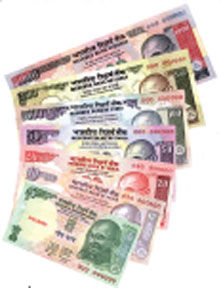|
Indian rupee slumps to record low:
Central Bank takes precautions
The Indian rupee slumped to a record low of less than 69 to the
dollar on Wednesday and it is considered as its worst performance since
1995 on growing worries that foreign investors will continue to sell out
of a country facing stiff economic challenges.
 “Not only the Indian rupee, but also currencies of several trading
partner economies have sharply depreciated against the Sri Lankan rupee.
We are taking precautions to mitigate the adverse impact,” said
Director, Economic Research of the CB, S. Gunarathne.She said that due
to the appreciation of the Sri Lankan rupee against these currencies,
imports will become cheaper and therefore it will lead to an increase in
imports while reducing our export competitiveness and widen the trade
deficit. “Not only the Indian rupee, but also currencies of several trading
partner economies have sharply depreciated against the Sri Lankan rupee.
We are taking precautions to mitigate the adverse impact,” said
Director, Economic Research of the CB, S. Gunarathne.She said that due
to the appreciation of the Sri Lankan rupee against these currencies,
imports will become cheaper and therefore it will lead to an increase in
imports while reducing our export competitiveness and widen the trade
deficit.
Since India is one of our main trading partners, with the sharp
depreciation of the Indian rupee we expect the risk of an increasing
import bill and widening trade deficit, she said.
The major concern is motor vehicles and there has been a growing
possibility that the importation of motor vehicles into Sri Lanka could
accelerate in the period ahead, CB sources said. Considering the adverse
consequences on external sector balance, the CB has decided to stop the
trend.
To deal with the emerging risk, the Monetary Board at its meeting
last week decided to impose a 100 percent margin deposit requirement
against Letters of Credit opened with the commercial banks for the
import of motor vehicles, other than buses, ambulances, lorries and
trucks.
Accordingly, Letters of Credit for the importation of specified
vehicle categories could be done only with a minimum cash margin of 100
percent, with immediate effect. The Monetary Board has also decided to
review the imposition of this margin after six months.
Gunarathne said that apart from the rupee appreciation, crude oil
prices may increase with increasing tension in the Middle East while
possible military strikes in Syria will pose a risk on external sector
stability.
The prospect of further instability in the Middle East is reflected
in financial markets, according to international media.
The price of crude oil has surged to a six-month high and a barrel of
Brent crude jumped 6% to $117 on Wednesday, compared with less than $100
a barrel as recently as June. However, it fell again to $108 with
indecision by the UK of a strike on Syria.
According to analysts the price could eventually surge to $125 if air
strikes are launched and $150 a barrel if the military action disrupts
production in the region.
That would be beyond the all-time high of $147 a barrel seen at the
height of the financial crisis in 2008.
As BBC reported, Bank of America Merrill Lynch has forecast a spike
in oil prices of $120-$130 a barrel.
Although Syria is not a main oil producer, analysts expect
instability in the gulf region would disrupt oil supply.
- GW
|


